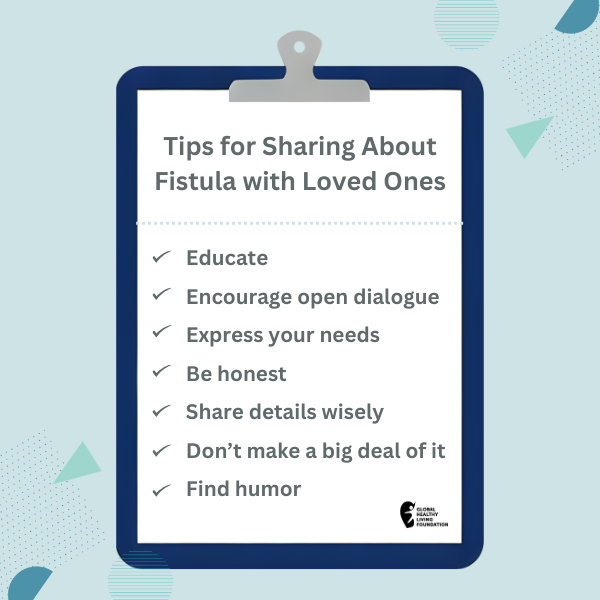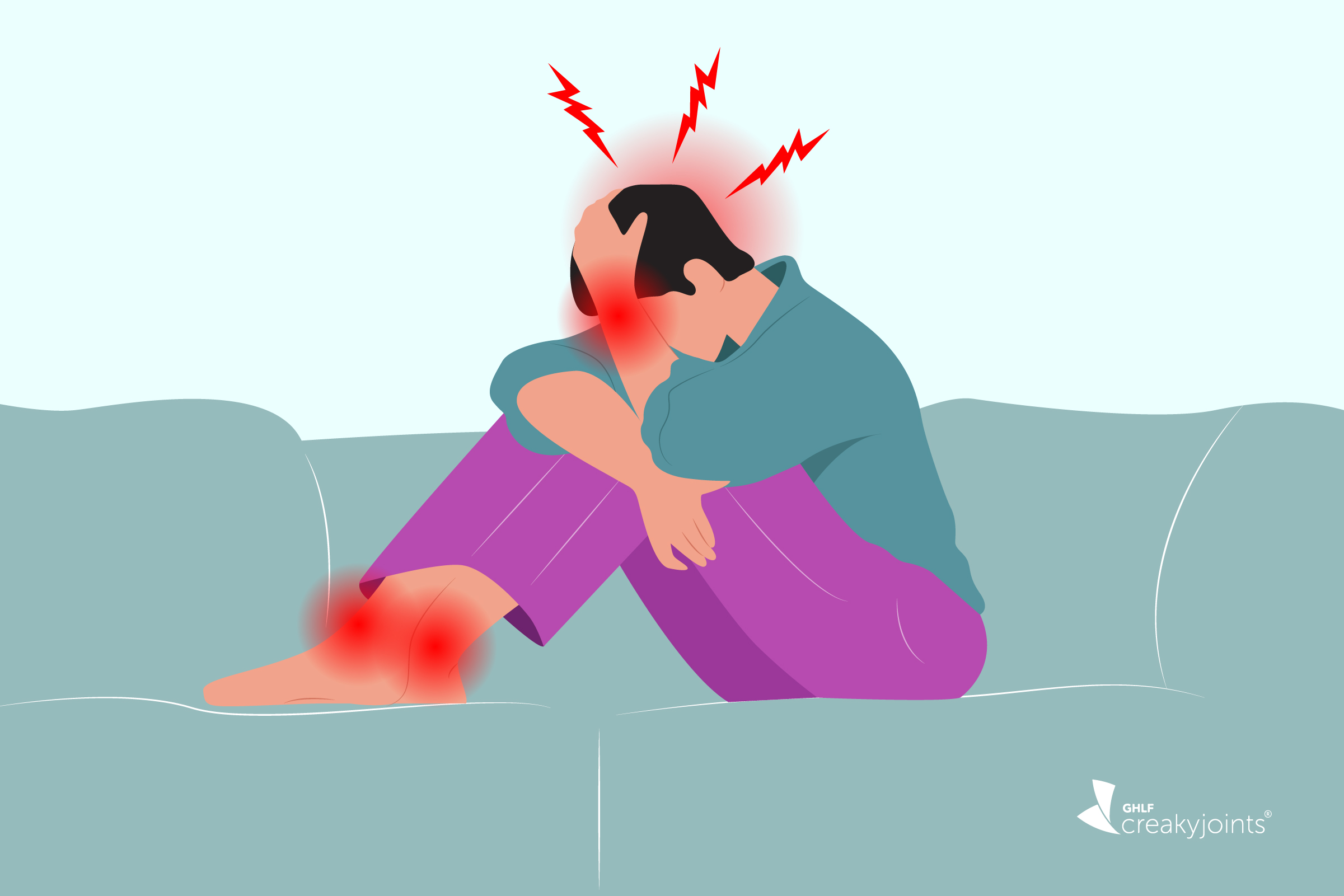In honor of World IBD Day, dietitians from three different continents share tips on managing diet and inflammatory bowel disease (IBD).
Fistula Symptoms — What They Are and How to Talk About Them
Fistula Symptoms — What They Are and How to Talk About Them
Talking about fistula symptoms to your providers and loved ones can feel awkward and even embarrassing — but these tips can help you start the conversation.
February 1, 2024
Nina Wasserman

Check out Your Guide to Understanding Complex Perianal Fistula for more information on this topic.
A fistula diagnosis can initially feel overwhelming. You might experience symptoms that seem embarrassing or uncomfortable, such as stool or gas leakage, which can impact your body image and self-esteem. It’s understandable if you’re hesitant to discuss these symptoms with others.
However, it’s important to remember that reaching out to your health care provider and sharing what’s going on is a crucial step. It’s your health care provider’s job to listen, no matter how uncomfortable it feels to talk about your symptoms.
The good news is that most fistulas can be detected early, and there are several available treatment options. By openly discussing your symptoms with your health care professional, you can begin a treatment plan right away. Left untreated, the condition can get much worse.
You also need a support network of loved ones with whom you can share your intimate information. Talking about what you’re experiencing can provide emotional relief and help you feel more connected with those around you.
What Is a Fistula?
A fistula is one of the major intestinal complications of Crohn’s disease, occurring in between 35 percent and 53 percent of people with Crohn’s, according to a 2023 study in the Journal of Clinical Medicine. In general, a fistula is an abnormal tunnel between two areas of the body.
People with Crohn’s can develop fistulas, which occur when an ulcer penetrates the intestinal lining and forms a painful tunnel in the perianal area, sometimes opening up on the skin’s surface. This condition is also known as a perianal fistula.
Gastroenterologist Adam F. Steinlauf, MD, FACP, an Associate Professor of Medicine at the Icahn School of Medicine at Mount Sinai Hospital, works daily with patients dealing with fistulas at the Feinstein Inflammatory Bowel Center of Mount Sinai Hospital.
While fistulas can occur in people of all ages, they often affect younger adults in their 20s and 30s. “The most devastating is the perianal fistula,” Dr. Steinlauf says. “It affects patients’ social lives and sex lives. In younger people it can impact dating.”
Diagnosis and Treatment
If your doctor suspects you have a fistula, you will likely undergo a rectal exam followed by an MRI to help define the shape and size of the fistula. A colon or rectal surgeon may recommend an examination under anesthesia.
According to Dr. Serre-Yu Wong, MD, PhD, a gastroenterologist and an Assistant Professor at the Icahn School of Medicine at Mount Sinai Hospital, treatment for fistula depends on the severity. In general, treatment will involve both medicine and surgery.
If you require surgery, a surgeon may clean the tract out and put in what’s called a seton to keep the area open and draining. A seton is a soft surgical thread that is passed through the opening of the fistula and then through the anus. It is then tied and left to keep the tunnel open so it can drain. The goal of surgery is to heal the fistula and prevent damage to the sphincter muscles, which control your bowel movements.
For less severe fistulas, a fistulotomy can be done to open up the site and let it heal. Or a surgeon can make a flap out of healthy colon tissue and close the inner opening. In most severe cases, an ostomy may be required to divert the discharge away from the fistula.
Surgery is typically combined with medications for the best approach, says Dr. Steinlauf. In addition to antibiotics, biologics are showing promise in closing fistulas.
There is also ongoing research on the use of a stem cell treatment called darvadstrocel in fistula management, and convincing evidence suggests its potential to be more effective than other surgical treatments.
What Are the Types of Fistula?
The most common type of fistula that affects about 20 percent of people with Crohn’s disease is a perianal fistula, says. Dr. Wong.
There are also less common enterocutaneous or colocutaneous fistula that form abnormal connections from the intestines to the surface of the skin. Internal fistula, where there is no external opening on the body, can be in the following areas:
- Rectovaginal, a connection between the lower intestine and the vagina
- Colovaginal, an opening between the colon and vagina
- Enteroenteric, a connection between two parts of the intestines
- Enterovesical or colovesical, a connection between the intestines and the bladder
- Enterocolonic, a connection from the colon to another part of the intestines
However, perianal fistula are most commonly associated with Crohn’s and they get their own disease classification, says Dr. Wong.
Risks of Untreated Fistula
Left untreated, fistulas are debilitating and can do additional harm to your body. Sometimes the opening can become clogged with a build-up of discharge and it can form an abscess. Complex cases of fistula can lead to sepsis, which can be potentially life-threatening. Nerve damage, infection, and kidney failure are associated with fistulas.
Fistulas can grow and form more branches, says Dr. Wong. They can become more complex and cause more damage in the anal canal and damage the tissue of the sphincter. With more tunneling, they can create more abscesses. Their growth can affect continence. It is a very serious condition that needs immediate attention.
Understanding Fistula Symptoms
The main two symptoms of perianal fistula are pain and drainage. The location and severity of the fistula will determine your symptoms. Fistulas can initially cause a lump or swelling around the anus that can be very painful.
You may feel pain or irritation when sitting, moving, coughing, or having a bowel movement. The growth of perianal fistula can also cause drainage of pus, blood, stool, or mucus.
You can experience additional symptoms such as:
- Fever
- Chills
- Redness
- Bleeding
- Constipation
- Uncontrolled bowels
How to Describe Fistula Symptoms to Your Doctor
Talking to your doctor about the unpleasant symptoms of perianal fistula can be very hard. Dr. Wong agrees that getting patients to open up about what is going on is a huge issue. “These can be patients in their 20s and 30s and their social life is important to them. It can feel disfiguring and awful and some patients are afraid to discuss their symptoms.”
Still, it is imperative to seek out a gastroenterologist or colorectal surgeon if you are experiencing fistula symptoms. “We are here to help and see what we can do,” says Dr. Wong. “We need to know and we need to know in a timely fashion.”
Dr. Steinlauf adds that going to a center that specifically works with patients with inflammatory bowel disease (IBD) can make the conversation easier since the health care professionals are practiced in talking about IBD and complications such as fistulas. He says his patients are ready to talk about their symptoms and eager to get treatment. “They need relief,” he says, and they want their social lives back.”
If you suspect you may be dealing with a fistula, Dr. Steinlauf suggests preparing for your appointment in several ways:
- Bring your medical history of Crohn’s disease or other inflammatory bowel disease, if you have one
- Note the location and severity of your pain. Is there pain or tenderness around the rectum? Do you feel a tender lump?
- Report any fluid drainage issues and describe whether it is pus, fecal matter, or blood
- Describe any additional symptoms such as fever or chills
- Be persistent in being seen right away, especially if there is a possibility of infection to avoid sepsis
Seeking out mental health support is also extremely important, says Dr. Wong. You are already dealing with the stress and stigma of inflammatory bowel disease. When you add the complications of perianal fistula in addition to that, it can be very overwhelming.
Dr. Wong suggests mental health support for all her patients. “The rate of recurrent disease is a reality for people with perianal fistula. It may well be a part of your life. Let us help to support you,” she says. While a general therapist can be very effective, she suggests a mental health team that specializes in people with IBD.
How to Describe Your Symptoms to Your Loved Ones
We don’t always like to talk about the messy details of our health because it makes us feel vulnerable and opens us up to possible rejection. But the fact is you are probably far more aware of your condition than others around you. And it may help to talk about it. It can give you more confidence and give others an opportunity to be compassionate and understanding.
“[Perianal disease] really affects people’s lives at a deep level and we need the courage and wherewithal to talk about it,” says Dr. Wong.
Here are a few tips for sharing with the people close to you:
- Educate: Explain to them what fistula is and how it affects your life. Let them know when pain is affecting your ability to take part in activities. And if you need surgery, let them know when so they can help.
- Encourage open dialogue: Tell them it’s OK to ask you questions and that you will answer as best you can. Living with a chronic illness can be unpredictable and limiting. When the people you love don’t understand or accept how your condition affects you, it can add to your stress.
- Express your needs: Don’t leave them guessing as to what you want. Be clear on what you need from them, whether it’s something practical or whether you just need some kind words or a hug. If you need them to just listen, let them know that their support can make a big difference in your journey.
- Be honest: Don’t try to hide your condition. You are more likely to receive understanding and support if they know what you are going through.
- Share details wisely: You can explain your basic symptoms and share with others if you have pain or feel uncomfortable, but you don’t have to let everybody know everything — find a few safe people whom you can trust with your intimate details. Some people are better at handling your personal information than others.
- Don’t make a big deal of it: Fluid leakage, incontinence, or passing gas are all common with fistula. When it happens, be honest and take care of it but don’t draw unnecessary attention to it.
- Find humor: Laughter relieves stress and puts yourself and others at ease.
Finding the right time and place to talk about your health with your loved ones is also important. You don’t want the conversation to be rushed or stressed. Some ways you can create an atmosphere of dialogue:
- Ask them when it is a good time to talk.
- Be courteous of their time and be patient with interruptions.
- Put boundaries on the conversation and be aware of your listener.
- Stick to your own feelings and avoid judging others.
One of the ways your loved ones can be helpful is by coming to appointments with you. Perianal fistulas are a complex condition so it’s helpful to have someone there with you to take notes.
It’s understandable to feel embarrassed by the symptoms of perianal fistula, but it’s important to push past that and seek out professional medical help and to reach out to your support network. Living with a perianal fistula can become much more manageable with the treatment, support, and encouragement you need.
Gut Culture Podcast
Check out Gut Culture, a podcast that gut checks assumptions about IBD (Inflammatory Bowel Disease) through real conversations with two health care leaders. Listen now.
This article was made possible with support from Takeda.
Source:
Anal Fistula. Mayo Clinic. 2018. https://www.mayoclinic.org/diseases-conditions/anal-fistula/care-at-mayo-clinic/mac-20352874.
Interview with Gastroenterologist Adam F. Steinlauf, MD, FACP, Associate Professor of Medicine at the Icahn School of Medicine at Mount Sinai Hospital.
Interview with Dr. Serre-Yu Wong, MD, PhD, a gastroenterologist and an Assistant Professor at the Icahn School of Medicine at Mount SInai Hospital
MedlinePlus. Fistula.
Surgery for Crohn’s Disease. Crohn’s and Colitis Foundation. 2020. https://www.crohnscolitisfoundation.org/what-is-crohns-disease/treatment/surgery.
Tan, Z, et al. “Causal Link between Inflammatory Bowel Disease and Fistula: Evidence from Mendelian Randomization Study.” Journal of Clinical Medicine. March 24, 2023. doi: https://doi.org/10.3390/jcm12072482.
SUBSCRIBE TO GHLF
RELATED POST AND PAGES
_
Was this article helpful?
YesNo







